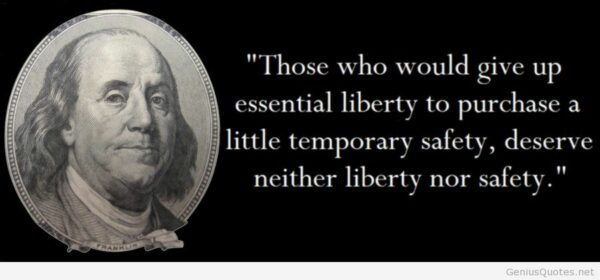Just to point out, in case you were wondering. Drs. Wintermute & Hemenway are leftists and rabidly anti-gun/anti-self defense .
More Than Gun Violence That Differs Between US, Other Places
So-called gun violence is higher in the United States than in other first-world nations. It’s a point that is continually brought up, in part because we also are the only first-world nation to actually respect people’s gun rights.
As we’ve noted in previous posts, ABC News has been running a series about rethinking firearm-related violence here in the United States. We’ve poked an awful lot of holes in some of their stories, and today’s isn’t likely to be any different.
You see, they’re focused on comparing the United States to other countries on this subject.
The United States has a gun violence epidemic, and it’s not one shared by its peers. The nation that by one estimate has more guns than people has the highest rate of firearm deaths compared with other high-income countries. Mass shootings, an all-too-common occurrence in the U.S., are also exceedingly rare in peer countries — where governments have often been quick to pass gun reform in the wake of such tragedies.
“Compared to the other peer countries, basically what we have is lots and lots of guns, particularly handguns, and we have by far the weakest gun laws. Not surprisingly, we have huge gun problems,” David Hemenway, director of the Harvard Injury Control Research Center, told ABC News. “I think if we had basically the gun laws of any other developed country, we’d be better off.”
It’s unclear if gun prevalence definitively impacts gun violence, though research by Hemenway’s center has found links between a large number of guns and more firearm homicides, suicides and accidents. The implementation of new gun restrictions has also been associated with a drop in firearm deaths, a 2016 review of 130 studies across 10 countries found.
The U.S. is “not necessarily a more violent society than others,” Dr. Garen Wintemute, director of the Violence Prevention Research Program at UC Davis, told ABC News.
“What we have is unique access to a technology that changes the outcome — firearms,” he said.
It’s not uncommon to compare the U.S. with other developed countries, especially after yet another horrific mass shooting. There are developing countries with higher rates of firearm deaths than the U.S., though comparing gun violence among peers helps to control for other factors, Hemenway said. And while there are lessons in other nations’ policy measures that could help address the problem here, because the U.S. is on such a different plane when it comes to civilian gun ownership, it will also take more research and multiple, targeted solutions to address the scope of the problem, experts said.
“Other countries do better. We should be able to figure out how to do better,” Hemenway said.
Hemenway is essentially arguing that the only real difference between these other nations and the United States is our lack of gun laws and that we really should embrace how the rest of the developed world treats firearms.
Well, that might be a compelling argument if it wasn’t premised on such a faulty concept.
The United States is a unique experiment, one that may look like the other developed nations of the world, but isn’t, and for a number of reasons. One of those is indeed our Second Amendment protections of our right to keep and bear arms, but there are other differences as well.
For one thing, we tend to be more racially diverse.
England, as an example, is 87.2 percent white and only three percent black, three percent Indian, 1.9 percent Pakistani, two percent mixed, and 3.7 percent other.
Meanwhile, we’re only 61.6 percent white, 12.4 percent black, 10.2 percent classified as multiracial, six percent Asian, 8.4 percent other, 1.1 percent Native Americans, and 0.2 percent Pacific Islander. Then, by ethnicity, they have 18.4 percent Hispanic. In other words, we’ve got a lot more ethnicities trying to share this patch of land.
Now, I’m not saying that any of these minorities are more prone to violence than anyone else, but it’s not out of the realm of possibility that all these ethnic groups rubbing together may create some kind of tension that we just haven’t resolved that results in that violence. After all, we live in a time when everyone is accusing everyone else of being racist. It’s possible that racial animosity–which goes in all directions–may result in people feeling like they don’t have to play by the rules.
Or, it may have no difference. We simply don’t know, but it is a data point that shows there are differences between us and many other developed nations.
But that’s only one potential difference.
Let’s also talk about poverty. America is the land of opportunity, but it’s also the land of falling on your butt if you’re not careful. Many people do just that and rebuild. Others don’t and some start off on their butts and foster resentment.
Among the 38 nations that make up the Organization for Economic Co-operation and Development (OECD), the majority of which are developed nations, the United States has the fourth-highest poverty rate. The three nations with more poverty? Chile, Israel, and Mexico. Of those three, only Israel can be universally considered developed and they have a problem with violence as well, though theirs comes in the form of terrorism.
So it’s not difficult to see that the United States has some stark differences that separate it from other developed nations. Poverty alone may account for all of the difference. This holds up upon more localized examination.
After all, we think of cities like Chicago, Detroit, and Saint Louis as being extraordinarily violent, but even there, you’ll see that the violence is generally localized. Where? In the poorer neighborhoods in the city.
In other words, poverty within our cities also seems to have a direct correlation with violent crime in our country. That’s poverty that doesn’t show up in other nations for various reasons.
Where is that in Hemenway’s examination?
It’s not there because it’s not useful for him to push his preferred narrative. It’s just that simple.
And I haven’t even gotten into all the nations with strict gun control laws that have much worse violent crime rates than we have.
So don’t come to me about what other countries do or don’t do. Those countries aren’t the United States, so their experiences are largely irrelevant.




